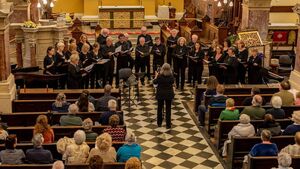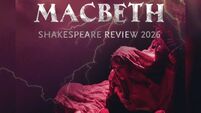View from the Green Room: Eclectic mix from Madrigallery

Pauline Kennedy conducts Waterford's Madrigallery Choir.
Madrigallery returned to their favourite space at Christ Church on Saturday last to a full Cathedral and a programme that was framed by its traditional repertoire of high-end classical choral but with the odd modern curve ball thrown in.
It’s all part of the choir’s ambition to add modern work to its concerts.
When the choir regrouped post-Covid, musical director Pauline Kennedy moved to freshen up their programme somewhat.
I say “somewhat” because all the fundamentals of Madrigallery remain – the layered entries, the sharp and pithy exits, the movement around the choir’s sections of the main themes, the dynamics that always appear to happen naturally and unnoticed and, above all, the quality of the singing. Because everyone in Madrigallery can sing, blend and keep time in the most intricate of arrangements.
If you go out in a madrigal like tonight’s “Too much I lamented” from the quill of Thomas Tomkins (1572-1656), there’s no way back. There are more falalas here than there are faux-opera stars in showers and there’s a swing-like feel to the madrigal that is just a delight.
The opening Cantate Domine from American Mark Hayes (b. 1953) is a dramatic delight with its strong feel of attack over a percussive piano from Oonagh Drohan that would frighten the dead. This is energy from start to finish and the mix of Latin and English with its vocal layering is Madrigallery at its best.
The Kim Andre Arnesen (b. 1980) “Even when He is silent” is inspired by a short but deeply moving text scratched on the wall of a cellar in Cologne, Germany, written by a Jew in hiding from the Nazis. The choral ascent to that final “I believe in love” overcoming a mix of faith and despair is very moving.
The LIBRA string quartet brings that mixture of quality and fun to everything they perform.
Every musical theatre fan values West Side Story as probably the best musical ever written and LIBRA’s medley is a huge crowd pleaser. Melodies from “Highlights from Amadeus” and the evocative “Gabriel’s Oboe” hang in the ether of this wonderful Christ Church where the hand of history is always on our shoulders. Gardel’s tango from Scent of a Woman is a real spirit-lifter to close out the LIBRA set.
A jazz trio backs Madrigallery in the final set and the Joni Mitchell classic “Both Sides Now” carries that reminder that no matter how much living we do, there will always be more to experience. A 1966 Jack Jones ballad “A Day in the Life of a Fool” by Carl Sigman/Luiz Bonfa recommends a life characterized by love and passion, even if it turns out to be somewhat foolish or naive.
Charles Villiers Stanford (1852-1924) enjoyed a revival last year – the centenary of his death – and it’s great to see his “Blue Bird” here with soprano Fiona Lonergan featured. It is set to the words of L'Oiseau Bleu, a poem by Mary Elizabeth Coleridge, which depicts a blue bird in flight over a lake and is generally considered one of the best English partsongs ever written.
“Dies Irae”, written by American Michael John Trotta (b.1978), is just the ticket to send us out into the night with that sense of drama we all love. The rhythm pounds along, harmonies cluster and swirl as the soprano line soars over everything. It’s a mix of medieval chant, flowing legato singing and incredible energy.
A great way to round off a memorable evening in the old cathedral.






